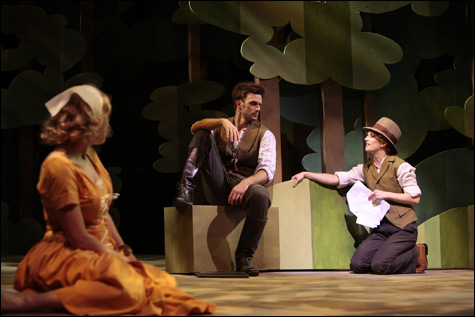
AS YOU LIKE IT: Loud, fast, highly physical, and filled with the ache of love. |
Up close, the Forest of Arden, an elevated glade tucked into Boston Common, looks like verdant, dappled clouds tacked to two-by-fours. But wander back to the Parkman Bandstand, before which As You Like It unfolds as this year’s offering of Free Shakespeare (presented by Citi Performing Arts Center through August 3), and set designer Scott Bradley’s jumble of cutouts on poles looks more like a forest. Such are the perplexities of pitching an al fresco show to thousands of people. As director Steven Maler knows from 12 years of amplifying the Bard in the city’s great outdoors, subtleties designed for those in front will be lost to those picnicking near Tremont Street. So his As You Like It is loud, fast, and highly physical. But the ache of love at the core of Shakespeare’s romantic pastorale will be felt as through an analgesic.
This is the second time As You Like It has taken a turn on Boston Common. It’s a natural, since the comedy quickly leaves the repressive court for the more liberating — if also cruel — elements. The mercurial Duke Frederick has usurped his brother Duke Senior’s kingdom, and the true duke has taken up rustic residence in the forest. In Maler’s early-20th-century staging, Frederick is a fascist whose underlings wear red armbands bearing a Mussolini-esque logo. And Duke Senior, himself a carnivorous usurper in the land of Bambi, has arrived in Arden in the vintage airplane we see crash-landed at the back of the woods.
Rosalind, the deposed duke’s daughter, remains at court to keep Duke Frederick’s daughter, Celia, company. At least she does for Shakespeare’s first act — long enough to be love-smacked by Orlando, youngest son of Sir Rowland de Bois, come to try his luck against Frederick’s thuggish wrestler, Charles. Charles doesn’t knock Orlando out, but Rosalind does. When she’s banished by her uncle and dons male clothing to head for the forest, Celia goes along, as does the ribald jester, Touchstone — here pedaling a bicycle-drawn cart from which he takes a break to shake up some martinis. Orlando, to escape his malevolent older brother’s murderous designs, also goes into the woods, accompanied by a faithful septuagenarian.
Before you know it, Orlando is tacking bad love poems to the lumber and being treated to romantic aversion therapy by the effeminate young forester who looks a lot like his own true love. Given the gender-bent situation in which a woman disguised as a man makes love to a man (both of them in Shakespeare’s day played by men), some modern productions, among them a few all-male ones, have seemed to credit Shakespeare with the invention of the omnisexual. The production on the Common remains mostly hetero — save for a moment when Orlando and his mock boy love share an unexpected kiss that turns our hero quite quizzical for a moment.
Those who count Rosalind among Shakespeare’s grand creations may not be satisfied by Marin Ireland’s antic take on the character, with her elongated Valley-girl vowels, her squealing giggle fits, and her hands that can’t keep themselves off Orlando. She is engaging, in a screwball-comedy-heroine way, but there is no sense of her ruefully counseling Orlando in the ways of love while at the same time drowning in it herself. She and Ali Marsh’s Celia pass the time at court as if at a slumber party, and Marsh’s magazine-enraptured princess of a Celia seems to wake from it faster than Ireland’s giddily besotted Rosalind does.